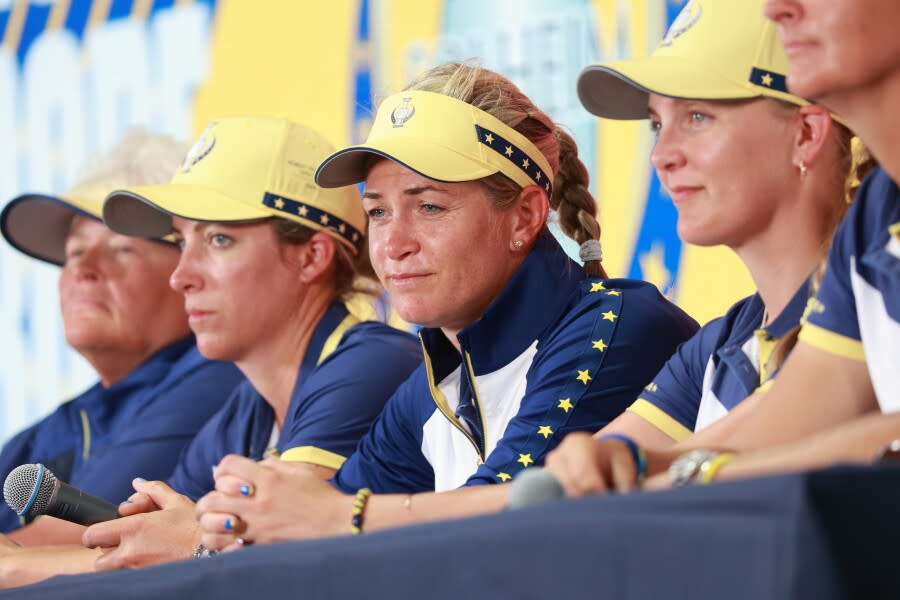Sports
Emotional Solheim Cup exemplified by singing, dancing and some tears

GAINESVILLE, Va. – On the left side of the European team’s cottage, affixed to the exterior of the second floor, a large, circular clock with hands and numerals showed 5:28 p.m. Sunday afternoon at Robert Trent Jones Golf Club.
You could almost hear it tick; it was that quiet. Nothing more than the mild stirrings on the club’s primary roadway.
It was a disparate atmosphere to the one experienced over a week of practice and competitive play in the 19th Solheim Cup.
This cottage, which sits adjacent the one the Americans used for their team room, offered a little bit of fish food to those hungry for any controversy, but there was nothing of substance. It was just a matter of personal and professional space, and maybe a little pettiness.
This Solheim Cup, one of the most emotional ever, had nothing to do with animosity. Even when a couple of U.S. caddies ripped off their shirts and ran amok on the second hole of a match, no public beef ensued. A few writers harrumphed, but European captain Suzann Pettersen just joked, “Sex sells. Go for it.”
(There were issues off the grounds, related to fans trying to get onto the grounds. That one is going to linger, but that’s on the LPGA and had nothing to do with the players and teams.)
U.S. finally gets the headline it wants: Americans win Solheim Cup
There were a number of ways a U.S. win could have played out on Sunday, but the Americans ultimately got what they wanted.
For nearly three years, Pettersen has been at the Euro helm. Retired since her iconic (true use of the word) Solheim Cup-winning putt in 2019, she’s now 43 and a mother of two.
Want to talk about emotions, Pettersen displayed it in spades during her career. She’s still got that passion, but it was displayed differently on Sunday.
With the outcome determined and the last match finally played out, the Americans gathered as a group in the 18th fairway and walked in unison towards the green for the official trophy presentation. The European contingent moved aside into the left rough, a symbolic transferring of power.
Pettersen was already there, both arms draped around the shoulders of Emily Pedersen, a captain’s pick who had played well through two days but struggled mightily in a 6-and-5 singles loss to Megan Khang, a crucial blow to Europe’s aspirations of a record-tying comeback.
Pedersen, whom Pettersen vociferously defended as an integral part of the team, was inconsolable. Hers was the second match in singles and against America’s biggest bundle of energy. The Dane’s day included a shank off a tee box and, after Pettersen tried to instill some measure of confidence, an immediate hook into a hazard on the next hole.
As Pedersen wept, her head hanging, Pettersen talked to her in a soft voice, tilting her head to try and meet her player’s eyes.
Nearby, Carlota Ciganda melted into the arms of Pettersen’s husband. The Spanaird was a home hero last year, clinching Europe’s retention. She went 1-3 this time around, losing her singles match all well.
Eventually, the four of them found each other and formed a small circle. “I’m so f***ing proud of you,” Pettersen said to both. She repeated it, again and again. Perhaps coarse, it was also motherly.


A handful of minutes later, it was Pettersen fighting back tears, something she’s become more accustomed to since leaving the game as a player.
“I’m a mom now, so I’m quite sensitive, quite emotional,” Pettersen said. “I cry from literally nothing.”
Her stint as European Solheim Cup captain had come to an abrupt and unsatisfying end. For Pettersen, though, true sadness derived, not from her losing or that she, personally, had lost her purpose. But from the fact that, for the first time since she dedicated herself to something other than golf, she one of them again.
“What I’ve loved the most about doing this, and I really mean that from the bottom of my heart, is even though I haven’t been competitive playing week in, week out, I still feel like I’ve been a part of the player group. As a retired player, you step away, you don’t see everyone every week, you miss seeing your friends on tour,” she said.
“So just feeling kind of a part of that player body has, for me, kind of gotten me up every morning wanting to make this as good of an experience for all of them. That’s probably what I’m sitting back with. Kind of now that I’m done, hopefully I’m not going to be cut off the WhatsApp group. Yeah, I’ve really enjoyed that.”
Narratives are a funny, fickle thing. No matter how long standing they might be, they can change suddenly and seemingly forever. Then, they can shift and send you in a new direction.
Pettersen was Europe’s fiery stalwart. Then she was too spirited and bad for the cup’s persona. Then she was a legend. Then she was a victorious captain. Now, she’s a captain who, technically, never won in two tries.
On the other hand, U.S. counterpart Stacy Lewis has gone from being publicly perceived as a losing captain to one who, technically, never lost in two attempts.
What never changed for Lewis was her approach. After all, everything she implemented previously resulted in a tie – not defeat – so why ditch it? No, instead she dug further into the analytical trenches.
While Pettersen tapped into the intangibles, Lewis was resolute in prioritizing the cold truth of numbers, which, this time, added up to 15 ½ points and America’s first Solheim Cup win since 2017.
Shortly after Pettersen and her vice captains left the media center Sunday evening, Lewis and her full, victorious team sat on the stage.
They looked spent.
No champagne bottles or cigars (if any partake). No drunken silliness or excessive jubilation.
“We haven’t gotten to celebrate yet,” said Lauren Coughlin, who went 3-0-1 in her debut, playing before friends and family in her home state.
“This has been seven years in the making for a lot of the women on this stage,” added Lewis. “There’s a lot – actually 10 that haven’t had this celebration yet, so we’re going back to the team room to celebrate.”
Nine of those players were also on the 2023 team. As Europeans were cannonballing into a pool that Sunday in Spain, Americans were ready to leave, heartbroken by the Finca Cortesin beauty.
It was on the flight back, that the moment hit Lewis.
“I was sitting on the airplane with my daughter, and she was sleeping and I just lost it and I started crying,” Lewis said. “I was like, we did all this work for these girls to play to a tie, and that was literally the only moment. From that point on, it was right back to work because I don’t want that to happen again.”
Part of that work was to make sure her team had fun. They wanted a karaoke machine, they got a karaoke machine.
“Literally,” Lewis said earlier in the week, “I’ll get whatever they need to help them play good golf.”
In the chicken-or-the-egg paradox, fun came first. Fun begat good golf which begat more fun which begat more good golf which begat a crystal trophy.
“There was just something about this team that was different,” said Lexi Thompson, who was making her seventh and possibly final Solheim Cup appearance. “The atmosphere, the energy from the team rooms to the bus rides to the first-tee experience.”
The opening-hole, outside of the opening day when inexcusable transportation issues delayed fans’ entrance, was electric. An estimated 2,000 people horseshoed the tee box, where music pulsated to ear-damaging degrees and everyone from former President Barack Obama to a caricatured Abe Lincoln showed up.
Nelly Korda emerged from her bubble, spun around in circles, and shaked and shimmied. Khang, who must run on a self-changing hybrid battery, bounced, skipped, pumped and jumped.
Everyone sang, everyone danced – the Europeans, too. It’s something we always see at a Solheim Cup. It’s just been a while since we’ve seen the Americans extend it to Sunday night.
After their final obligation, the U.S. team went back to its cottage and, finally, drank champagne from the trophy.
Maybe it was there that the moment hit Lewis. Maybe it would come later when she was alone with her family. But sitting in the media center, just before the bubbly, Lewis admitted, the stress was removed. “The shoulders are already down,” she said.
Business finished, it was time to move on, off to the hotel to party for as long as the adrenaline would allow. Fronted by a freshly unburdened Lewis, as social media showed, they marched in, singing and dancing.
And they sang, “I Wanna Dance with Somebody.”




